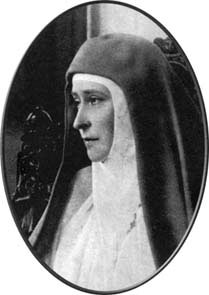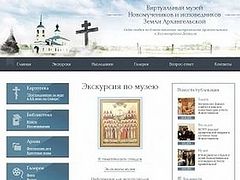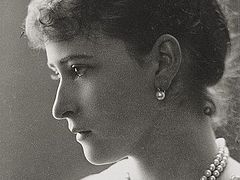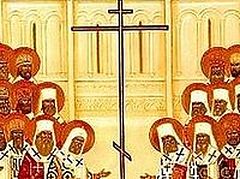Sermon read by Archbishop Mark of Berlin on the feast day of the Holy New Martyrs and Confessors of Russia in 2001
The Divine meaning of suffering can be understood only through the help of grace. For this, the Lord consoles His sorrowful disciples and all of us, sending us “the Comforter… even the Spirit of truth” Who “will guide you into all truth” (John 15:26, 16:13).
 New Martyr Grand Duchess Elizaveta Feodorovna.
New Martyr Grand Duchess Elizaveta Feodorovna.
Martyrdom is the same thing as Christianity. These two words have the same meaning. Hatred against Christ and His followers should not surprise us. It is natural, it was foretold by the Lord Himself, Who said: “If the world hate you, ye know that it hated me before it hated you” (John 15:18).
What sort of disciples would we then be, if we did not follow the footsteps of our Teacher? The Lord forewarned us that we should not be tempted if we are to suffer for Him. And we suffer, every one of us, in our own measure, it was not only the New Martyrs, to whom our church is dedicated, and the martyrs of all times, who suffered, but even we, for only then are we truly Christians.
Doubt will creep into the soul weak in faith, doubt in the power of the Savior. But this doubt enters when a person accepts salvation and the work of the Savior not from a spiritual but from a material point of view. Had the Lord given us eternal life here on earth, undying life, had He preserved us from persecution and suffering, many multitudes would follow Him. But how would they follow Him? Not from love, but for their own advantage. The work of salvation would then be observed from a utilitarian point of view, any free will for mankind would be excluded. Our world and contemporary man are in every way subjected to mechanization, preferring robots, fearing and hating expressions of the free will of man, and so represses it in every dictatorial form we know. Why did they so savagely act out against this will in Russia in the beginning of the last century, and in other places even to this day? Because free will bears witness to the Creator.
We are recognized as His disciples from the love which we have for each other. This love is founded upon love for God. What kind of love would it be if it were the result of force? Evil in this world so surrounds the person who has left God as the source of love, that such a person despises all that is Divine, and first of all God-bearers and Christ-bearers, that is, those who truly fulfills love for God, for Christ, those who fulfill His testaments by their free will and love for Him.
For those who have stepped away from unity and communion with God, evil becomes their divine, as it was written: “whosoever killeth you will think that he doeth God service” (John 16:2). Yes, such murder is demanded by the evil god, the god of this world. The very sight of a righteous soul is intolerable for the sinner. That is why the followers of Christ will be persecuted. It is said: “Yea, and all that will live godly in Christ Jesus shall suffer persecution” (2 Timothy 3:12). A life of good deeds of a Christian shames the filthy life of a lover of sin. The Lord Himself foretold: “If they have persecuted me, they will also persecute you” (John 15:20), and moreover, they shall “cast out your name as evil” (Luke 6:22), and “And ye shall be hated of all men for my name's sake” (Luke 21:17).
The name of Christ, the name of the Christian irritates those who hate God. We must carry this name with dignity, and not take the name of “Christian” lightly. Only in such a state will we easily endure our podvig. We must prepare ourselves for podvig while loving Christ, and loving the sufferings He sends us. Reading the Lives of the Saints, learning of and pondering their sufferings, we come to accept the notion of the necessity of suffering, and we make sorrow and pain natural for ourselves. How important is it for us to know who the New Martys and Confessors of Russia were, whose spiritual children we all are! But we are a small flock. Yet how many apostles were there? Twelve, upon whom a host of Pharisees rose up against, with chains, dungeons, slander, insults, beatings, lethal dangers and death itself. But they were prepared for this, and said “For we cannot but speak the things which we have seen and heard” (Acts 4:20). They bore witness not only in word but by their lives, of Him who gave them life, Christ.
The Holy New Martyrs and Confessors knew the power of Christ, they saw the truth and could not hide it. They endured sufferings and tribulations in silence, silence with rebuked their torturers, while others denounced them in word, as First-Martyr Stephen did, “Ye stiffnecked and uncircumcised in heart and ears, ye do always resist the Holy Ghost: as your fathers did, so do ye” (Acts 7:51).
Even now, many, many people resist God, resist the Lord Christ and the Holy Spirit. But true Christian zeal does not look upon the multitude of those who have power on earth and the power to commit untruth. True Christian zeal pays no heed to threats and danger, true Christian zeal is aimed at one thing only: to speak the truth, clear to all who deceive, so that they do not cunningly overcome the simple of heart. The blood of the New Martyrs and Confessors of Russia displayed the beauty and power of the Russian Church. The patience exhibited in tribulations will shine like the sun. The soul approaching perfection can invite even the winds, as we read in the Old Testament: “Awake, O north wind; and come, thou south; blow upon my garden, that the spices thereof may flow out” (Song of Songs 4:16).
Divine wisdom knows that the aroma of good works increases many-fold when it is set into motion through tribulation. Tribulations awaken the predisposition to podvig inherent in man. The good works of many saints remain hidden. Without being subject to external trials, they lived their lives in silence, in seclusion, in the desert. But the podvig of the New Martyrs became our common legacy, they are the lessons and guidance for our lives.




